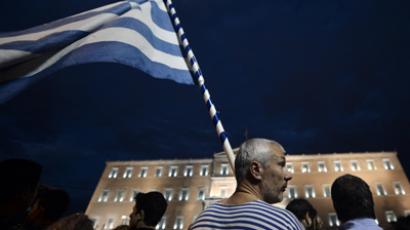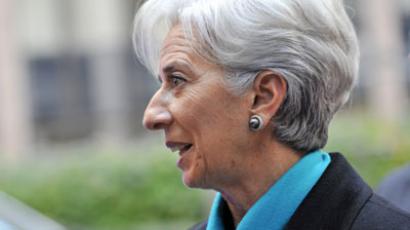Germany gives green light to €44bn package to Greece
Germany’s lawmakers have agreed to forgive some of its loans to Greece. Fears that the country’s default would hurt the whole EU bloc overshadowed an almost a €17bn price tag for Germany.
Out of the total 584 MPs 473 voted in favour, with 100 against. Eleven MPs abstained. This comes at a time when public polls in Germany show that 46% of people in the country think Greece must be left to its own devices.The key to today's vote was the dispute between Chancellor Angela Merkel and Social Democratic Party (SPD). While the SPD said a Greek rescue was essential, as otherwise it would hurt the whole Europe, and Merkel was reportedly more concerned with winning votes at the September 2013 elections. Failure to approve Greece's revised aid package would have been a major blow to Europe, and also for the global economy, according to Germany Finance Minister Wolfgang Schäuble talking at Friday’s vote in the Bundestag.The Finance Minister acknowledged the new measures for Greece might cost Germany up to €730mn ($950mn) next year. Analyst estimate a full haircut of Greek rescue loans could cost Germany up to €17bn ($22bn), which is more than 5% of Berlin's Federal budget. This money will come out of the pockets of German taxpayers, which could become toxic for the current Chancellor in her election bid.Merkel’s strategy is reported to be as follows: “Do just enough to keep Greece afloat but spare German votersfor now the news that even more of their money will be required to get the Greeks back on their feet,” as the Associated Press says.So far, Merkel's hard-nosed approach to Europe's debt crisis has bolstered her popularity at home. “Ms. Merkel doesn't want to stand in front of her voters and tell them that the Greek rescue will cost taxpayers a couple of billions,” Christoph Weil, an economist with Commerzbank added.At a meantime, SPD parliamentary leader Frank-Walter Steinmeier said Angela Merkel's administration “should have been more explicit about Greece's problems earlier this year,” as The Guardian reports.Late Monday’sdeal by the finance ministers of the 17 countries that use the euro and the ‘troika’ ofinternational creditors paves the way for Greece to finally receive €44 billion ($57 billion) in critical rescue loans, without which the country would face bankruptcy and a possible exit from the euro. The rescue plan also involved a debt buyback programme, as well as interest rate cut on existing loans. However, it stops short of forgiving outright debt owed to some euro area countries, including Greece’s leading creditor Germany. Chancellor Angela Merkel's government has strongly opposed a so-called “haircut” in the run-up to elections next autumn.While the Germany Finance Minister signalled this would be the last time Germany essentially bankrolled the Greek bailout fund, most analysts agree more rescue money wouldn’t necessarily stem the tide.“…I think, this package is, unfortunately, another ad-hoc measure and not a long-term solution to Greece’s problems,” Nora Hesse, deputy head of the Open Europe Berlin think tank, told RT.And what EU countries seek to gain when they grant bailout money to indebted countries is to win more time for the troubled economies so that they could take more substantial action. The EU, which registered another unemployment record of 11.7% in October, certainly needs structural reforms, Hesse concluded.Financial Industry Expert Dr. Jan Hagen told RT the limited loan deal was more to the benefit of other EU leaders than Greece itself.“They had to provide some funds to Greece, but they’re still shying away from the real need of Greece, and that is a significant write down on the Greek debt, [which] still hasn’t happened. So my projection is that this was one crisis summit, but we’ll definitely see the next one coming in the coming weeks.”Hagen believes Friday’s vote was cast to help maintain the illusion that EU politicians still have the reins on the eurozone crisis.“The whole thing is political…Germany is committed to the euro project. German politicians really fear being shown as the nation that brings down the euro, so they try everything to keep the euro intact. I think Germany has no alternative.”















